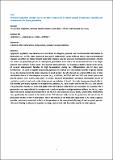Por favor, use este identificador para citar o enlazar a este item:
http://hdl.handle.net/10261/244804COMPARTIR / EXPORTAR:
 SHARE
BASE SHARE
BASE
|
|
| Visualizar otros formatos: MARC | Dublin Core | RDF | ORE | MODS | METS | DIDL | DATACITE | |

| Título: | Persistent epigenetic changes due to elevated temperature in mature gonads of laboratory zebrafish and consequences for future generations |
Autor: | Valdivieso, Alejandro; Anastasiadi, Dafni CSIC ORCID; Ribas, Laia CSIC ORCID ; Piferrer, Francesc CSIC ORCID | Palabras clave: | Zebrafish DNA methylation Temperatures Gonads Transgenerational |
Fecha de publicación: | 6-oct-2020 | Citación: | Joint Meeting EPIMAR and GDR 3E (2020) | Resumen: | Epigenetic regulatory mechanisms can contribute to integrate genomic and environmental information to determine sex. In fish, these processes are poorly understood. Some evidence shows that environmental changes can affect sex ratios through epigenetic changes in genes involved in gonadal development. Altered sex ratios can potentially persist in subsequent generations even when the environmental cue is no longer present, but evidence is also scarce. To elucidate both questions, we exposed zebrafish (Danio rerio) larvae of several independent families to high temperature during sex differentiation (18¿32 days post fertilization). We used a targeted sequencing approach to analyze DNA methylation profiles of genes related to sex development and the stress response in adult gonads. Results showed sex-related differences in DNA methylation levels of steroidogenic enzymes (e.g., cyp19a1a, hsd17b1 and hsd11b2) and transcription and growth factors (e.g., dmrt1 and amh). In testes, elevated temperature increased methylation levels of cyp19a1a, cyp11a1 and amh, while it decreased methylation of dmrt1. To study transgenerational effects, five families previously exposed to temperature (parental, P), were raised until to the first (F1) and second (F2) generation. Family sex ratios and global DNA methylation in the testis were assessed. As expected, the P generation was masculinized by temperature. Family-dependent multigenerational effects (to the F1) were observed but no transgenerational effects (to the F2) were observed in any family. Global DNA methylation was significantly decreased in the testis of the 35°C-derived males in the F1 generation but not in the F2 generation neither in the P generation. These alterations in the testicular epigenome in F1 males suggests possible, previously unnoticed, effects of temperature in the unexposed offspring of heat-exposed parents. This novel finding is relevant in a global warning scenario and calls for similar studies in other species | Descripción: | 1st EPIgenetics in MARine biology congress (EPIMAR) and French Groupement de Recherche Épigenétique en Ecologie et Evolution (GDR 3E) 1st WebConference Epigenetics in Ecology and Evolution, 6-9 October 2020 | URI: | http://hdl.handle.net/10261/244804 |
| Aparece en las colecciones: | (ICM) Comunicaciones congresos |
Ficheros en este ítem:
| Fichero | Descripción | Tamaño | Formato | |
|---|---|---|---|---|
| Valdivieso_et_al_2020.pdf | 111,06 kB | Adobe PDF |  Visualizar/Abrir |
CORE Recommender
NOTA: Los ítems de Digital.CSIC están protegidos por copyright, con todos los derechos reservados, a menos que se indique lo contrario.
